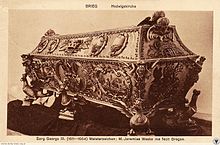George III (Brieg)
George III von Brieg (Czech Jiří II. Břežko-Lehnický , Polish Jerzy III brzeski ; born September 4, 1611 in Brieg ; † July 4, 1664 ibid) was governor of Brieg 1637–1639 and then until 1653 in joint regency with his brothers Ludwig and Christian Duke of Brieg. After the inheritance was divided up in 1653, Brieg fell to him, which he ruled alone until his death. 1663-1664 he was also Duke of Liegnitz , which he had inherited in 1663 from his brother Ludwig. After the death of Duke Heinrich Wenzel von Bernstadt in 1639, he held the office of governor of Silesia .
Origin and family
George III was the eldest son of Duke Johann Christian in Brieger and his first wife Dorothea Sybille , who was a daughter of Elector Johann Georg von Brandenburg .
On February 23, 1638 he married Sophie Katharina (1601-1659), a daughter of Duke Karl II of Münsterberg and Elisabeth Magdalena von Brieg , in Bernstadt . Elisabeth Magdalena was a sister of Georg's grandfather Joachim Friedrich and thus his great cousin. This marriage came from Dorothea Elisabeth (1646–1691), who married Prince Heinrich von Nassau-Dillenburg on October 13, 1663 .
On October 19, 1660, Georg III married. second marriage to Elisabeth Marie Charlotte von Pfalz-Simmern (1638–1664), daughter of Prince Ludwig Philipp von Pfalz Simmern and niece of the former Bohemian King Friedrich V von der Pfalz , who died two months before Georg. This marriage remained childless.
Life
After his father Johann Christian fled to Thorn in 1633 , Georg and his younger brother Ludwig IV , who were studying abroad, were also ordered to go there to await further developments. After the evangelical estates elected the absent Duke Johann Christian as director of the Silesian Princely Congress on July 11, 1634 , the family returned to Brieg. In the same year Georg was sent as the highest-ranking member of a delegation by his father to negotiate in Dresden. When the father went into exile again in Thorn at the beginning of January 1635, he left Georg and his younger brother Ludwig in Brieg.
To his son Georg III. To secure the Principality of Brieg, Johann Christian von Thorn from the Emperor Ferdinand II informed him in writing of his submission, which he repeated on September 20, 1635 in the required form. In his place, Georg was allowed to take his hand vow to the emperor. By paying homage, Johann Christian was able to keep his Duchy of Brieg, which he now handed over to his son Georg. In 1637 he appointed him his governor.
After the death of his father Johann Christian in 1639, Georg III inherited. and his two younger brothers Ludwig IV and Christian the Duchy of Brieg and Ohlau , which was assigned to their mother as a Wittum in their will. At first they ruled their property together. They initially refused to split, as their relatively small inheritance was additionally burdened with a severance payment for the siblings excluded from the succession from the father's second marriage . Only after the Duchy of Liegnitz and Wohlau came to them in 1653 after the death of their uncle Georg Rudolf, who died childless , did they share the property. Georg received Brieg, Ludwig Liegnitz and Christian Wohlau and Ohlau .
As early as 1649 Georg was accepted into the Fruit-Bringing Society by Prince Johann Georg II of Anhalt-Dessau . Friedrich von Logau , who worked as a councilor at the court of Georg's brother Ludwig IV , also took part in the celebrations . After all three brothers were still without male descendants in 1660, George III tried. with his sovereign, the Bohemian King Leopold I , to extend the right of inheritance to include his daughters, but received no promise.
After the death of his brother Ludwig in 1663, Georg III inherited. the Duchy of Liegnitz. After his death just a year later, Brieg and Liegnitz fell to the youngest brother Christian, who was thus able to unite the Liegnitz sub-principalities in one hand. The office of governor was transferred to the Breslau bishop Sebastian von Rostock . This gave up the connection between the episcopate and governor , which had been broken under pressure from the estates in 1608 .
literature
- Historical Commission for Silesia (ed.): History of Silesia , Vol. 2: The Habsburg era 1526–1740 . Thorbecke, Sigmaringen, 2nd, reviewed edition. 1988, ISBN 3-7995-6342-3 , pp. 79, 81 and 204.
- Norbert Conrads : The Prussian exile of Duke Johann Christian von Brieg . In: Schlesien in der Frühmoderne: On the political and intellectual culture of a Habsburg country (= New Research on Silesian History, Vol. 16). Edited by Joachim Bahlcke . Böhlau, Weimar 2009, ISBN 978-3-412-20350-4 , pp. 47-49.
- Hugo Weczerka (Hrsg.): Handbook of the historical places . Volume: Silesia (= Kröner's pocket edition . Volume 316). Kröner, Stuttgart 1977, ISBN 3-520-31601-3 , p. 290 as well as family tree on p. 592-593.
- Rudolf Žáček: Dějiny Slezska v datech . Praha 2004, ISBN 80-7277-172-8 , pp. 176, 413 and 428.
Web links
Individual evidence
- ^ Norbert Conrads : The Prussian exile of Duke Johann Christian von Brieg . In: Silesia in early modernity: On the political and intellectual culture of a Habsburg country . New research on Silesian history. ed. v. Joachim Bahlcke . Weimar 2009, ISBN 3-412-20350-5 , p. 48f.
- ↑ http://www.uni-bielefeld.de/lili/haben/useelbach/texte/logaucv.html
| personal data | |
|---|---|
| SURNAME | George III |
| ALTERNATIVE NAMES | Brieg, George III. from (full name); Břežko-Lehnický, Jiří II .; Brzeski, Jerzy III |
| BRIEF DESCRIPTION | Duke of Brieg and Liegnitz |
| DATE OF BIRTH | September 4, 1611 |
| PLACE OF BIRTH | Brieg |
| DATE OF DEATH | 4th July 1664 |
| Place of death | Brieg |
